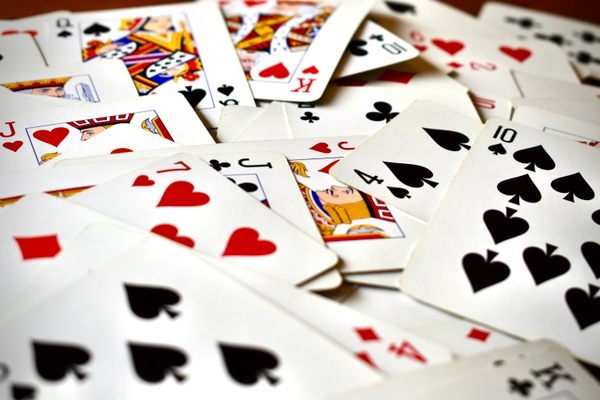
Atlas Obscura’s Ultimate Word Game Tournament
From Password to Mad Libs to Wordle, we pit our favorite lexical pastimes head to head.

We all love word games, but with so many choices, ranging from the oldest of the old school to latest app craze, how do you decide what to play? Welcome to Atlas Obscura’s Ultimate Word Game Tournament, a throwdown involving 16 sweet word games—from classic chestnuts to new kids on the block—duking it out for alphabetical domination. We’re restricting the field to games that are not generally reliant on trivia knowledge—for example, no crossword puzzles—and since there are so many Scrabble-adjacent contenders, we’ve respectfully removed the O.G. from the field as well.
There are, of course, many worthy games that could have also made the field: Quiddler, Apples to Apples, Taboo, 25 Words or Less… But we had to start somewhere and, well, I’m the selection committee.
Like some other tournaments you might have heard of, this one is sorted into regions, and you’ll notice some rough, heavyweight matchups right away (Spelltower vs. Wordle in the first round—ouch!). So sharpen your pencils, dust off those dictionaries—and let the games begin.
Word Hunt Region: Spelltower, Wordle, Boggle, Hangman
Creative Region: Ghost, Mad Libs, Magnetic Poetry, S + 7
Party Games Region: Upwords, Bananagrams, Syntactics, Codenames
Tricky Definition Region: Password, Hey Robot, Balderdash, Contexto

Word Hunt Region
SPELLTOWER: In this Tetris-Boggle hybrid, you’re faced with a jumble of letter tiles and you have to make words by connecting adjacent and diagonal tiles. Once you connect a word, it disappears, and if you make a word longer than five letters, all the surrounding tiles disappear, too. Mostly the game is Tetris-like, in that you play not to lose: In infinite Puzzle Mode, the screen keeps filling with letters from the bottom, and Rush Mode lights a fire under you with a time crunch. Tower Mode, on the other hand, lets you play to clear the screen to win.
WORDLE: You get six attempts to guess a five-letter word, and with each guess, you learn which letters are in the word, and which are in the right place. Welsh software engineer Josh Wardle first created the game to play with his partner, but when he made it public in October 2021 it went viral, and he famously sold his iteration of the game to The New York Times just a few months later. Wordle’s hardly a new concept; it’s basically the same as the pen-and-paper game Jotto, or the eighties television show Lingo, which got a glow-up in 2023 with RuPaul as host. What Wordle has done differently is the social component: The app offers a clever graphic that lets you share your results without spoiling the day’s puzzle for others. Spinoffs have abounded—Dordle, Trordle, and Quordle (2, 3, and 4 words to guess simultaneously); Artle (guess the artist from the artwork); Worldle (guess the country from the map image), and more—though the Times has begun to crack down on any unofficial use of the “-dle” suffix.
BOGGLE: You shake a box filled with dice that feature letters on each side—16 cubes in the classic version, 25 in Big Boggle, 36 in Super Big Boggle. They land in a square grid and your goal is to find words among them vertically, horizontally, or diagonally. Everyone writes down the words while sand runs through a little hourglass, and when the hourglass empties, you’re done. (I mean, or you can just set a timer for three minutes.) You get points if no one else has found your word, and significantly more points the longer the word is, so there is a strategic component: Blitz lots of short words that other people might miss, or focus on lengthier but potentially rarer and therefore less well-spotted entries.
HANGMAN: This is an ancient game of potentially sinister origins:. Imagine you’re in the 17th century, and the “Rite of Words and Life” is taking place in the gallows in your town square—the condemned might be given the opportunity to guess a word to spare his life. Today, the consequences are more metaphorical. Players have to guess a secret word of a certain number of letters. Get the letter right and it appears in the word; get it wrong and the person who’s set the secret word draws part of a stick figure in a gallows. Play ends with a correct guess or—gasp—an execution. The game show Wheel of Fortune uses the same mechanism within a less murderous framework. In English, vowels will be the most common letters (hence the requirement that you have to buy your vowels in Wheel of Fortune), which means that cruel Hangman setters might go for “rhythm” or “zephyr” or “jazz.”
Creative Region
GHOST: The first player calls a letter (say, “T”), the second player calls the next one (“T, H”), and so on. The trick is to begin to build a word, but letter you add can’t actually create a word (so if you say “T,H,E,” you lose). You can also challenge a player to name the actual word that begins with the string of letters they’ve just created (“What word starts with ‘T,H,V’?). If a letter makes a word or is successfully challenged, that player gets a “G.” Lose the next round, they get an “H,” and so on, until one player is a GHOST. With two players, the game is entirely solvable, as xkcd cartoonist Randall Munroe demonstrated. Variations abound, such as Superghost, in which you can stick a letter on the front or the back of a word. New Yorker writer James Thurber extolled this version in a 1951 essay on the subject, “Do You Want to Make Something Out of It?; or, If You Put an ‘O’ on ‘Understo,’ You’ll Ruin My ‘Thunderstorm’”: “The Superghost aficionado is a moody fellow, given to spelling to himself at table, not listening to his wife, and staring dully at his frightened children, wondering why he didn’t detect, in yesterday’s game, that ‘cklu’ is the guts of ‘lacklustre,’ and priding himself on having stumped everybody with ‘nehe,’ the middle of “swineherd.’”
MAD LIBS: In 1953, writers and humorists Leonard Stern and Roger Price invented a game where they wrote stories with key words left out. Five years later, they finally came up with a name for their game after overhearing an argument between an actor who wanted to ad-lib an interview and an agent informing him that that was “mad.” Stern and Price teamed up with their friend Larry Sloan and created a new publishing imprint, Price Stern Sloan, to publish Mad Libs, joining the lineage of publishing agencies that were created to print games (among them publishing giant Simon & Schuster, whose first offering was The Cross Word Puzzle Book, in 1924). Mad Libs has now sold more than 110 million copies. The game shares DNA with the Victorian parlor game Consequences and the Surrealist technique of an exquisite corpse, where one person writes a sentence, folds it over, and then another person has to continue the story based on just the sentence they can currently see.
MAGNETIC POETRY Dave Kappell, a Minneapolis-based songwriter, tried to unstick his writer’s block one day by writing words on scraps of paper and rearranging them at random. The game was working well until an ill-timed sneeze blew apart his composition. To make the words stick, he added magnets to the back. That was in 1993––smash-cut to 30 years later, and Magnetic Poetry has sold more than three million kits, which means there are more than a billion little magnetic word pieces floating on fridge doors worldwide.
S + 7 (or N + 7): This generative language game was developed by the Oulipo group, short for Ouvroir de littérature potentielle (“Workshop of potential literature”), a collection of mostly French writers and thinkers who created literature from restrictive techniques (such as Georges Perec’s La Disparition, a novel written, and also translated into English, without using the letter “e”). In the S + 7 game, you take any piece of text—well-known ones such as anthems or the beginning of the Old Testament work well—eliminate the nouns, and replace each one with the noun seven nouns down from it in the dictionary. Some might argue that S + 7 is less a “game” than a writing tool—but I’ve nevertheless included it because of its portability and adaptability. Any text in any alphabet-based language will work, and different dictionaries will generate wildly disparate results.

Party Games Region
UPWORDS: Upwords is like Scrabble, but simultaneously more and less complex. It operates three-dimensionally: You join letters to connect and build words, plus you can also place tiles on top of each other—the higher you can build, generally the more points you accumulate. But Upwords also eliminates several key elements of Scrabble: All letters are democratically worth one point each, and there aren’t special squares on the board. Paradoxically, it’s a disadvantage to be the first person to begin stacking letters, and it’s a huge advantage to use letters that are parts of multiple words.
BANANAGRAMS: Bananagrams has nothing to do with fruit other than the English alphabetical fact that the start of “anagram” is the end of “banana,” and therefore ripe for portmanteau-ing. Play starts with 144 tiles (in the branded version, they’re housed in a convenient fruit-shaped pouch), face down on the table, and players get the same number of tiles to begin. You create a sort of free-form Scrabble board in front of you, where all the words have to cross each other in at least one spot. Once you’ve played all your letters, you shout, “Peel!,” and everyone draws a new tile. You can keep rearranging your letters as often as you like, but to win, you can’t have any free-floating tiles remaining.
SYNTACTICS: A game with beautifully, unnecessarily novella-length rules for a fairly simple conceit. In this rare 70s jawn, you place words into syntactical, though not necessarily sensical, sentences (Noam Chomsky’s famous “Colorless green ideas sleep furiously” would be perfect here) along a recessed pathway that meanders through the board. If the little lexical units don’t align perfectly with the set path, not to worry: Something in the rules set accommodates more precisely for dangling bits, but in gameplay, the path seems to sort itself out in the end. The way you score is also pretty confusing, but once you get going, the game also demonstrates its own special logic.
CODENAMES: Living somewhere in the nexus of Memory, Taboo, and Minesweeper, Vlaada Chvátil’s 2015 board game Codenames has quickly become a staple in the word-based party tabletop rotation for its low barrier to entry combined with high reward for strategy and skill. In Codenames, the “spymaster” gives a single clue word to get the rest of the team to guess certain other words on the board, but to avoid having them select words that belong to the other team, or the single word that will blow up the whole game board. Only the spymasters know which words belong to which team.
Tricky Definition Region
PASSWORD: In this classic game, which has been featured on various television shows for decades, you have to convey words to your teammate only with single-word clues. Once you say a word, the other person on your team guesses, and you get to say one more word, followed by a guess, and so on. There are lots of strategies, perhaps building one clue upon another, and the more quickly you go, the better hints you’ll get to give. The team loses if the clue-giver says the password or any form of it, either by accident or on purpose, before the guesser figures it out.
HEY ROBOT: Each team gets a word, and you have to get the smart assistant or smart speaker of your choice—Siri, Alexa, Google, whatever—to say that word in its answer. The hard part? You can only pose the robot one question. Proper nouns such as “Serena Williams” are relatively easy (“Hey Robot, what tennis player, like her sister, Venus, was one of the greatest of all time in the Open era?), whereas abstract concepts such as “mortality” or more generic nouns such as “column” can be much trickier (therefore worth more points).
BALDERDASH: Also known as “Fictionary” or the “Dictionary Game,” in each round of Balderdash, one player (the “dasher”) reads aloud an esoteric word from the dictionary (or the game box) and writes the definition on a scrap of paper. The other players all make up definitions of that word on their own scraps of paper, and the dasher reads them all aloud. If you write the correct answer, you immediately get three points. Players who can pick out the correct one get two points, and if someone guesses your phony answer, you get one point; if no one gets it right, the dasher gets three points.
CONTEXTO: You guess a word, any word at all, and an artificial intelligence algorithm that has absorbed thousands of texts assigns that word a number ranking based on how close it is to the secret word, which is ranked “1.” You keep adding words, with unlimited guesses, attempting to get ever-closer to the secret. The algorithm generates its ranking based on context clues, and you don’t get punished for getting farther away from the word on subsequent guesses. There’s no punishment and no points assigned in Contexto. Ultimately, it’s less a game than an exercise in the arbitrary directionality of language—but the frustration and competition certainly feel game-like.

The Tournament
Round 1
Spelltower vs. Wordle: A very head-to-head of two frontrunners of the app era. Though Wordle has the edge in terms of current virality, Spelltower has versatility, replayability, game modes, and strategies in more dimensions—plus, in Tower Mode, you can still win the game, rather than playing not to lose.
SPELLTOWER
Boggle vs. Hangman: Hangman puts up a strong fight in the life-or-death suspense, but Boggle has the satisfying rumble when you shake the box, plus the thrill of sticking “er” and “ing” onto everything.
BOGGLE
Ghost vs. Mad Libs: Two absolute bangers. Mad Libs is terrifically funny and great to entertain children on road trips, but ultimately sort of one-note. Ghost, on the other hand, can turn a terrible car ride or bus trip into a delight, so long as no one is playing it absolutely optimally. And it requires nothing more than your voice and your mind.
GHOST
Magnetic Poetry vs. S + 7: The Oulipo game can generate some amazing poems (hot tip: use Urban Dictionary instead of Merriam-Webster), but Magnetic Poetry brings the nostalgia vibes. Neither is a game so much as a toy, which doesn’t entirely bode well for the next round.
MAGNETIC POETRY
Upwords vs. Bananagrams: Scrabble variants face off! Bananagrams is more shout-y and jovial, but Upwords’ surprising three-dimensionality lifts it above the competition.
UPWORDS
Syntactics vs. Codenames: Though Syntactics has the soothing nature of strolling through a well-trimmed hedge labyrinth, Codenames has dynamic competition and crowd appeal.
CODENAMES
Password vs. Hey Robot: “The password is …” might be one of word-game television’s greatest catchphrases, but Hey Robot is such a sleeper hit here that makes a word game out of the modern world in a way that will evolve with our times: You get to feel like your smart device is both reading your brain and completely out of touch. Feels like living in the 2020s.
HEY ROBOT
Balderdash vs. Contexto: In Balderdash you get to lie, and get rewarded for being good at it! While swimming upstream is fun for a while, Contexto has only one game mode, and a win is so rare as to be nearly impossible. You can smack your head on a lexical wall for hours.
BALDERDASH
Round 2
Spelltower vs. Boggle: Spelltower has all the advantages of adding Tetris to Boggle, and though Boggle tries to bring it with shaking the board, Spelltower quakes when it falls in Rush Mode. Plus, it works as solitaire or against other people (in leaderboards).
SPELLTOWER
Upwords vs. Codenames: Codenames is very customizable, brand-friendly, and can involve a nearly infinite number of players. It’s one of the most popular modern party games for a reason.
CODENAMES
Ghost vs. Magnetic Poetry: Nice try, magnets: In Ghost, you get to bluff.
GHOST
Hey Robot vs. Balderdash: Tricky matchup, but the algorithm has spoken: Reading the mind of a smart device to make it seem like it is reading your mind? It’s the Inception of modern word games.
HEY ROBOT

Final Four
Spelltower vs. Ghost: Spelltower brings it in the letter-manipulation realm, but the psychological appeal of bluffing, the social aspects, and being able to play without any devices or equipment (not even pen and paper!) is too strong.
GHOST
Codenames vs. Hey Robot: Codenames has party appeal, but so does Hey Robot, and Hey Robot also works beautifully when you play alone (unless you consider the device a person––and maybe you do).
HEY ROBOT
Championship
Ghost vs. Hey Robot: The ghost in the machine—er, the ghost vs. the machine. Ultimate low-tech vs. ultimate high-tech. Ghost pulls out all the stops with Superdeuper and its other variants, but Hey Robot’s simplicity, infinite complexity, and endless expandability pushes it ahead.
I consider this an upset from an upstart game—one that wouldn’t have even been imaginable a generation ago—but it’s such a worthy addition to a word game lineage that it deserves the prize. Even though it might be one of the newest games in the bunch, its simple game mechanism yet capacity for strategy and growth hearken back to the era of parlor-games-by-candelight. You can’t help but root for it. AI is here to stay; we might as well have a little fun with it.
Hey Robot wins!

Adrienne Raphel is the author of Thinking Inside the Box: Adventures with Crosswords and the Puzzling People Who Can’t Live Without Them, a New York Times Book Review Editors’ Choice; What Was It For, winner of the Rescue Press Black Box Poetry Prize; and Our Dark Academia.











Follow us on Twitter to get the latest on the world's hidden wonders.
Like us on Facebook to get the latest on the world's hidden wonders.
Follow us on Twitter Like us on Facebook